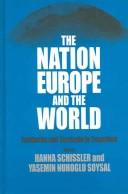| Listing 1 - 3 of 3 |
Sort by
|
Book
ISBN: 1283551012 9786613863461 9004231471 9789004231474 9781283551014 9789004224346 9004224343 6613863467 Year: 2012 Publisher: Leiden Boston Brill
Abstract | Keywords | Export | Availability | Bookmark
 Loading...
Loading...Choose an application
- Reference Manager
- EndNote
- RefWorks (Direct export to RefWorks)
Some 100 years ago, Mongolia gained independence from Qing China, and more than 20 years ago it removed itself from the collapsing Soviet Bloc. Since then, the country has been undergoing momentous social, economic and political changes. The contributions in Change in Democratic Mongolia: Social Relations, Health, Mobile Pastoralism, and Mining represent analyses from around the world across the social sciences and form a substantial part of the state of the art of research on contemporary Mongolia. Chapters examine Buddhist revival and the role of social networks, perceptions of risk, the general state of health of the population and the impact that mining activities will have on this. The changes of patterns of nomadism are equally central to an understanding of contemporary Mongolia as the economic focus on natural resources.
Land use --- Mines and mineral resources --- Miners --- Pastoral systems --- Environmental degradation --- Mineral industries --- Deposits, Mineral --- Mineral deposits --- Mineral resources --- Mines and mining --- Mining --- Natural resources --- Geology, Economic --- Minerals --- Land --- Land utilization --- Use of land --- Utilization of land --- Economics --- Land cover --- Landscape assessment --- NIMBY syndrome --- Degradation, Environmental --- Destruction, Environmental --- Deterioration, Environmental --- Environmental destruction --- Environmental deterioration --- Natural disasters --- Environmental quality --- Herding systems --- Pastoralism --- Animal culture --- Livestock systems --- Herders --- Herding --- Social conditions --- Health --- Employees --- Mongolia --- Mongġol --- 몽골 --- Mongol Uls --- Монгол Улс --- Mongġol Ulus --- Mongolie --- Mongolii︠a︡ --- Монголия --- Mongolei --- BNMAU --- БНМАУ --- Bu̇gd Naĭramdakh Mongol Ard Uls --- Bügd Nayramdah Mongol Ard Uls --- MNR --- МНР --- Mongolʹskai︠a︡ narodnai︠a︡ respublika --- Монгольская народная республика --- Meng-ku jen min kung ho kuo --- Menggu ren min gong he guo --- 蒙古人民共和國 --- Meng-ku --- Menggu --- 蒙古 --- Wai Meng-ku --- Mongolische Volksrepublik --- Mongoru Jimmin Kyōwakoku --- Mongol Népköztársaság --- Outer Mongolia --- Mongolia (Outer Mongolia) --- Mongolian People's Republic --- Mongolia (Mongolian People's Republic) --- République populaire de Mongolie --- Bu̇gd Naĭramdakh Mongol Ard Ulsyn --- Mongolian Republic --- Mongoliet --- モンゴル --- Mongoru --- 外蒙古 --- Gaimōko --- 蒙古人民共和国 --- Mōko Jinmin Kyōwakoku --- モンゴル人民共和国 --- Mongoru Jinmin Kyōwakoku --- Inner Mongolia (China) --- Utilisation du sol --- Mines et ressources minières --- Mineurs --- Pastoralisme --- Environnement --- Social conditions. --- Conditions sociales --- Dégradation --- Bu̇gu̇de Nayiramdaqu Mongġol Arad Ulus --- Mengguguo --- 蒙古国 --- Wai Menggu
Book
ISBN: 1781908176 1781908168 1306291240 9781781908174 9781781908167 Year: 2013 Publisher: Bingley, U.K. Emerald
Abstract | Keywords | Export | Availability | Bookmark
 Loading...
Loading...Choose an application
- Reference Manager
- EndNote
- RefWorks (Direct export to RefWorks)
Supplementary education consists of private instruction that complements and sometimes 'shadows' formal school content. Providers range from informal and part-time tutors to highly institutionalized, multi-national corporate franchises. This phenomenon is growing worldwide and has many potential impacts on formal education systems.This volume is the first multi-national examination of this topic and includes 'big picture' analyses to comparatively explain the intensity, authority and policy contexts of supplementary education. Quantitative and qualitative case studies of countries with high
After-school programs. --- Tutors and tutoring. --- Private tuition (Tutoring) --- Tutorial method in education --- After-school education --- Afterschool programs --- Teaching --- Remedial teaching --- Education --- Education. --- "Independent schools, private education". --- Compensatory education. --- Academic achievement. --- General. --- Secondary. --- Academic performance --- Academic progress --- Academic success --- Academic underachievement --- Achievement, Academic --- Achievement, Scholastic --- Achievement, Student --- Educational achievement --- Performance, Academic --- Progress, Academic --- Scholastic achievement --- Scholastic success --- School achievement --- School success (Academic achievement) --- Student achievement --- Success, Academic --- Success, School (Academic achievement) --- Success, Scholastic --- Underachievement, Academic --- Performance --- Success --- Education, Compensatory --- Cultural lag


ISBN: 157181549X 1782381740 9781782381747 Year: 2005 Publisher: New York Oxford
Abstract | Keywords | Export | Availability | Bookmark
 Loading...
Loading...Choose an application
- Reference Manager
- EndNote
- RefWorks (Direct export to RefWorks)
Textbooks in history, geography and the social sciences provide important insights into the ways in which nation-states project themselves. Based on case studies of France, Germany, the Netherlands, Spain, Greece, Turkey Bulgaria, Russia, and the United States, this volume shows the role that concepts of space and time play in the narration of ‘our country’ and the wider world in which it is located. It explores ways in which in western European countries the nation is reinterpreted through European lenses to replace national approaches in the writing of history. On the other hand, in an effort to overcome Eurocentric views,’world history’ has gained prominence in the United States. Yet again, East European countries, coming recently out of a transnational political union, have their own issues with the concept of nation to contend with. These recent developments in the field of textbooks and curricula open up new and fascinating perspectives on the changing patterns of the re-positioning process of nation-states in West as well as Eastern Europe and the United States in an age of growing importance of transnational organizations and globalization.
History --- International education --- Place-based education --- Study and teaching. --- Textbooks. --- Curricula.
| Listing 1 - 3 of 3 |
Sort by
|

 Search
Search Feedback
Feedback About UniCat
About UniCat  Help
Help News
News